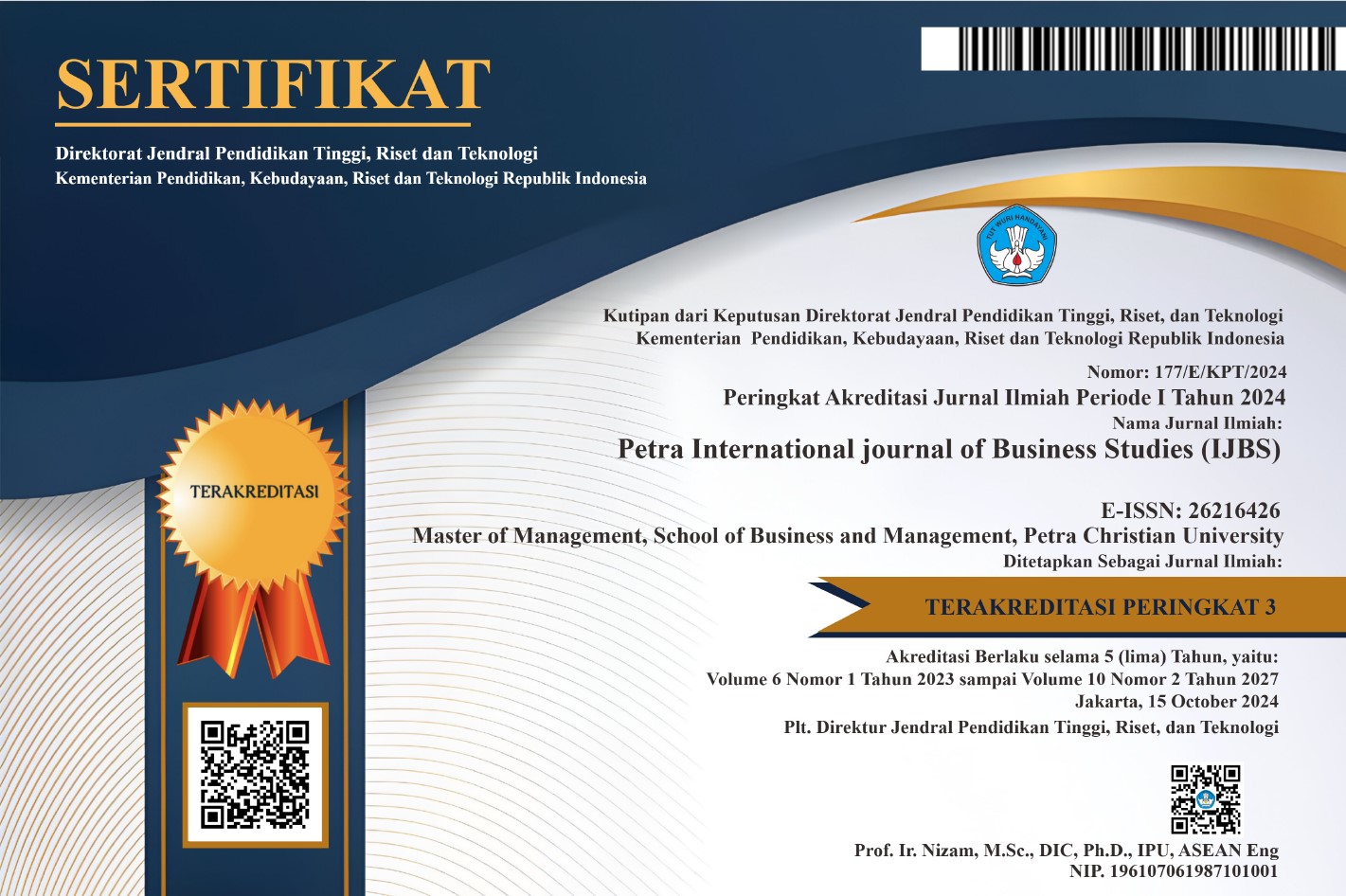The Impact of ‘No Work, No Pay’ Policy on Industrial Actions: A Case Study of ASUU at the University of Lagos
DOI:
https://doi.org/10.9744/petraijbs.8.1.43-53Keywords:
Policy, No work no pay, Industrial Action, Trade Union, Academic Staff Union of University, Collective ActionsAbstract
Trade unions regard the right to strike as a vital tool to counter low wages or unfavorable working conditions. This study explores the impact of the "No Work, No Pay" policy on industrial actions by the Academic Staff Union of Universities (ASUU) in Nigeria. Using a qualitative approach and a review of related literature, primary data were collected through structured interviews. The interview guide featured two sections: Section A addressed respondents' sociodemographic characteristics, while Section B focused on the study's core subject. The study's population consisted of 1,707 ASUU members, and 58 interviews were conducted across eight faculties at the University of Lagos, located on the Akoka campus. Data were analyzed using content and thematic analysis. Findings revealed that the "No Work, No Pay" policy has a significant influence on academic staff's willingness to engage in strikes and the frequency of such actions in the sector. The study concluded that the policy has a dual effect: it can deter strikes by encouraging alternative dispute resolution while reinforcing lecturers' determination due to perceived infringements on their rights. Therefore, the study recommended a continuous dialogue between lecturers and government authorities to address disputes constructively.
Downloads
References
Abdulraheem v. Olufeagba (2006) 17 NWLR Pt. 1008 P. 332 par. E-H; P.333 par A-D
Anonaba, C. G. (2015). Strikes in Nigerian Higher Education: An Appraisal. Paper presented at the 3rd School of Education and Humanities Interna-tional Conference on the Future of Higher Edu-cation in Africa held at Babcock University
Bawa, A. (2016). Student Protests and the Struggle for University Autonomy in South Africa. South Af-rican Journal of Higher Education, 30(1), 1–10.
Bhorat, H., & Cheadle, H. (2009). Labour reform in South Africa: Measuring regulation and a synthe-sis of policy suggestions. Development Policy Re-search Unit Working Paper 09/139. University of Cape Town.
Bryson, A., & Gomez, R. (2005). Why have workers stopped joining unions? The rise in non-membership in Britain. British Journal of Indus-trial Relations, 43(1), 67–92.
Chidi, O. C. & Shadare, O. (2017). Philosophical As-sumptions, Research Paradigms, and methodo-logical considerations in social science research. Unilag Journal of Business, 3(3), 82–99.
Ecoma V. (2022). No work, no pay: Implications on national development, Vanguard, September 1s,t 2022
Ekpo, H. (2016). The ‘No work, no pay' rule and la-bour relations in the Nigerian public sector: La-bour Law Review. Nigerian Journal of Labour Law & Industrial Relations, 9(1)
Enomah. S. & Omoregbe, J. (2010) Philosophy of civil disobedience and the imperativeness of 2009 ASUU strike: Implications for a sustainable higher education in Nigeria”. Continental Journal of Arts and Humanities, 2, 32-37,
Eseoghene, E. (2022). Nigeria: Analysing the legal implications of the ‘no work no pay' government policy. Retrieved from https://www.mondaq.com/nigeria/employee-rights-labour-relations/1247344/analysing-the-legal-implication-of-the-no-work-no-pay government-policy-
Estlund, C. (2002). Working together: How workplace bonds strengthen a diverse democracy. Oxford University Press.
Fajana, S. (2000). Industrial relations in Nigeria: Theo-ry and features (2nd ed.). Lagos: Labofin and Company.
Fox, A. (1966). Industrial sociology and industrial relations. royal commission research paper N0. 3. London: HMSO
Frankfort-Nachmias, C., & Nachmias, D. (2008). In Research methods in the social sciences. Re-trieved from http://store.vitalsource.com/.
Ige, A. M. (2014). The challenges of being a student of any public tertiary institution in Nigeria today. Journal of Studies in Education, 4, 128-141. https://doi.org/10.5296/jse.v4i1.1261
International Labour Organization (ILO), Convention concerning the Protection of Wages, 1 July 1949, C095, available at: https://www.refworld.org/docid/5c6fc25a7.html [accessed 20 September 2023
Kangai, C. (2012). Social research methods in higher education: A critical analysis of methodological issues and emerging trends at the Zimbabwe Open University
Olalekan, O. E. (2023). Nigeria: Termination of em-ployment: Is an employer liable to pay full salary where a contract is terminated within a new month? Retrieved from https://www.mondaq.com/nigeria/employee-benefits-compensation/1277854/termination-of employ-ment-is-an-employer-liable-to-pay-full-salary-where-a-contract-is-terminated nwithin a-new-month
Rose, E.D. (2008). Employment relations. (3rd ed). London: Pearson Education Ltd
SSANU v. Federal Government of Nigeria (2008) 12 NLLR (Pt 33) P. 407
Trade Disputes Act Cap T8 Laws of the Federal Re-public of Nigeria 2004
Additional Files
Published
Issue
Section
License
Copyright (c) 2025 Oluwabusayo Olanrewaju Oni, Mariam Gbajumo-Sheriff

This work is licensed under a Creative Commons Attribution 4.0 International License.
Petra IJBS (e-ISSN: 2621-6426) is published by Master of Management program, School of Business and Management, Petra Christian University, Indonesia (MM SBM PCU).












